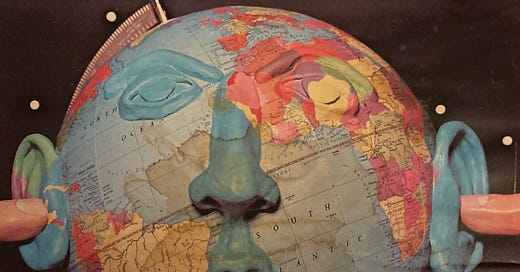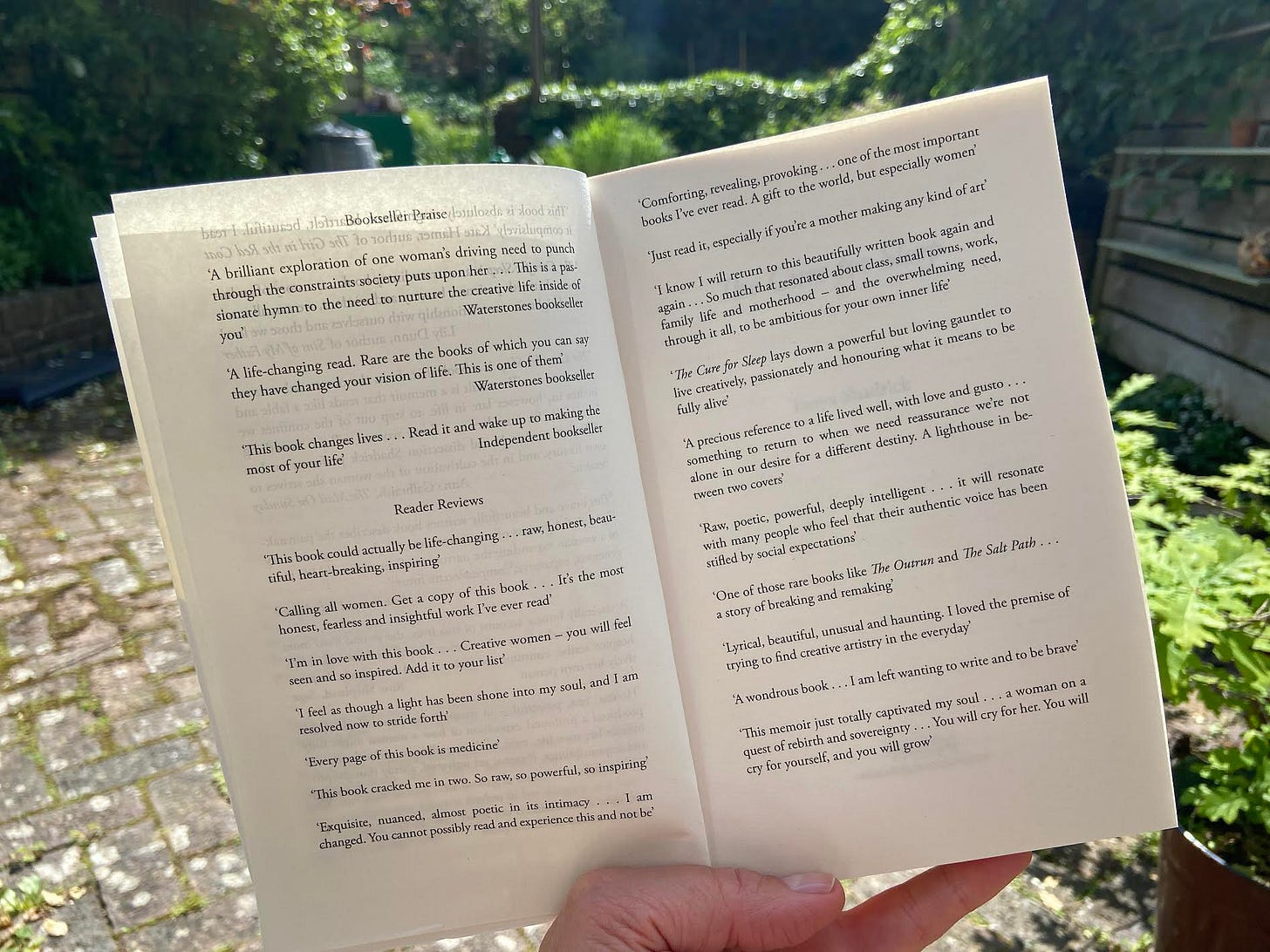The Cure for Sleep: Terrible Questions
Season 3, 003: What's the most difficult question you've ever asked - or had to answer? One where you felt your whole world depended on it...
Welcome to Issue 3 in Season Three of The Cure for Sleep on Substack: this companion project to my memoir of waking up, breaking free and making a more creative life. It’s a place where you can explore your own life’s most important threshold moments in the company of others who are also interested in revisiting their key times of choice, negotiation or conflict.
Two of the most difficult questions asked of me happen at the start and end of the book, the first from my husband, the last from my mother. The questions aren’t, in themselves, very terrible sounding:
Husband: ‘When are we going to have children?’ (p80)
Mother: ‘Do you love me?’ (p304)
And so the challenge for me was to convey their impact, as well as the deeper historical reasons why these were difficult for me to answer. Let’s look at how that works in the scene with Nye:
‘WHEN ARE WE GOING TO HAVE CHILDREN?
Nye’s question breaking the quiet of our New Year’s Day alone at home into sounds wild and discordant. A pigeon sobbed on our chimney top; outside, a child took a stick to the railings.
He’d put his book aside to look at me. Expectant.
I watched the light curdle and the small space between him and me separate, split. We were side by side in our ancient horsehair armchairs that had disgusted everyone but us when I bought them in my old hometown just hours before we married at twenty-five. Like yesterday, I thought, while realising, all of a sudden, that for Nye it may seem otherwise. A very long time ago, and too too much with just me for company.
Very slowly, reluctant suitor, I got down on one knee and reached for his hand while my dry throat tried to make tongue work.Is this how our marriage ends? I did not say.
‘When are we going to talk about it, Tan?’ Tears in his eyes, a catch in his voice. ‘I’ve always wanted this, since I was a boy myself. To be a father.’You are that for me, who never had one. This, too, I did not say.
What devices and word choices am I using here to convey the high stakes in this otherwise quiet domestic exchange?
Towards the end of that passage, you see another type of question emerge that becomes a repeating pattern in the story (as in my life): Of my not asking questions of huge importance to me. And this was another challenge in the book. To show the weight of those unasked questions. Their internal reality.
Here I am just weeks before the birth of my first child, at a last meeting with Yuri, the older man with whom I’ve shared an intense but platonic relationship across three years of monthly pub lunches and park walks. I’m certain he’ll never want to meet again now that I’ll always in future have a child on my hip:
I placed my hand on his, the first time, just a moment, fastidious as ever about his marriage: that circle he’d drawn around it at the start.
Do you love me a little, after all? No. I mean: Have I mattered to you? Will you promise always to remember me this way: a young woman in a lovely dress, just days before her first child was born?
All I wanted to ask, I swallowed. Pretending a need for the loo, I went to a cubicle and bit my hand that had just touched his until my tears and need to plead for love had subsided.
Now. This is a memoir not a novel. So all of those things really happened in the exchange with Nye and the one with Yuri. But it took me several drafts to get to that very naked revelation of feeling, of response. To select the right details. I had to feel it all again, fully. Really place myself back in those rooms. And then I had to allow myself to be unlikeable, open to judgement from the reader: not using those scenes to cast others as simple antagonists and me as the put-upon heroine.
It’s hard to return in memory and confront, frankly, our motivations, our stuck places, in relationship to others. But it can be powerful too: a way to begin our free movement away from those very same fears and compulsions.
Hence this month’s writing prompt…
your invitation to write
In 300 words or less, share a story of the most difficult question you've ever asked - or had to answer. One where you felt your whole world depended on it. OR: Share a memory of a time when you yearned to ask a question and didn’t. Recreate for us the place, the sensations, the stakes…
[Please read the guidelines for contributors if this is your first submission to the project.]
It has been a joy this month to start sending signed paperbacks out to some of the book’s very first hardback readers, people I didn’t know of until they reviewed it on Amazon and other channels. They have meant so much to me that I asked my publishers if the paperback could include their words alongside those from authors and media reviewers…
about tanya
author site | book site | instagram






Hello — this is my first submission. Many thanks to you Tanya for your unwavering encouragement!
I sat hunched and small, a fizzing bundle of self-hatred and yearning, a 22-year old woman in the front passenger seat of a small muddy Peugeot. Dusk spring skies darkened quickly. A sole blackbird chanted dutifully, highlighting the yawning silences between our words.
He spoke softly.
“But — do you not love me anymore?”
It had taken me months to get to this point. A slow process of noticing, feeling, knowing. Wishing otherwise.
It would be years before I would experience my own trust, my own heart, broken. But somehow I sensed it: that this was the worse side of the deal. That doing the breaking is worse.
My heartbeat was doing strange things. Speeding and slowing. My neck ached from cowed posture. I gazed up at the empty terrace in front of the car, felt my thumb rubbing against the fabric of the seat, searching for familiarity, reassurance.
I inhaled slowly, silently, and considered his question.
And considered what was beneath it. What was really being asked, by both of us, was not of love but: where do we go from here? Is this the end? Can we carry on, even if we want to?
I loved him, but that was beside the point, and I didn’t understand why. All I knew was the tight itch in the centre of my chest was whispering leave, go, stretch. This isn’t for you anymore.
So much about my life depended on what I said next. Oh, the vertiginous height of a binary decision. And right before I spoke I felt the weight of all that I knew I would eventually be brave enough to give up: the supportive family, the home to escape to, the friendship group. First love’s gentle adoration and sharp fierceness. Its history powerful, but not quite enough.
We're huddled under a blanket, by a fire. I am drunk. My friend hugs me, strokes my hair.
"You always ask me that when you're drunk", she says. "Of course I will. Of course".
My friend is a hairdresser. The thing I always ask her when I'm drunk is "Will you do my daughter's hair for her wedding?". My daughter is 8, is 12, is 15...I've been asking this for years.
Sometimes we have cried when I ask this question. Sometimes we've laughed as well. We cry because we don't think I'll make it to that wedding. We cry because what I'm really asking is "Will you be there for her? Will you have tissues in your bag in case she needs them? Will you hug her and tell her she looks beautiful? That she is beautiful? That she is loved?".
I am lucky. I've been here longer than anybody expected. My health rollercoasts a little, but my body never gets back to where it was. The cancer is slow - so slow - but implacable.
I'm about to restart chemotherapy, so this is raw. It's hard to write.
Of course, I'm not just asking about a wedding, I'm asking about mothering. Who will mother my children? I recruit friends, relatives. Now they're old enough I try to help them mother themselves, and each other. Sometimes I think they're better at it than I am.